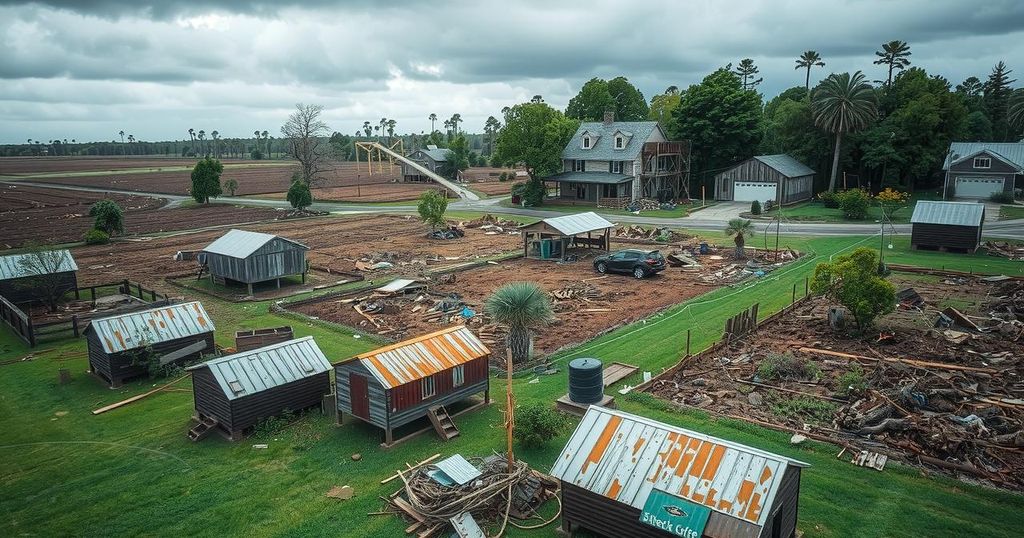Farmers in Georgia continue to struggle with extensive damage inflicted by Hurricane Helene, which occurred over two months ago. Losses are estimated to exceed $10 billion across the South, with cotton and poultry industries particularly hard hit. The emotional and financial toll on farmers is substantial as they confront decisions regarding recovery and rebuilding amidst an uncertain economic climate.
Farmers in Georgia are grappling with the aftermath of Hurricane Helene, which wreaked havoc on their crops more than two months ago. The landscape of Chris Hopkins’ farm, like many others in the region, is strewn with damaged equipment and felled trees, remnants of the storm’s destructive path. The hurricane made landfall in late September as a Category 4 storm, resulting in an estimated $10 billion in losses across affected states, including uprooted timber and devastated crops.
Hopkins faced severe losses, with about half of his cotton destroyed at a critical harvesting stage. Emotional and financial strains exacerbate the recovery process, as many farmers are left pondering whether to rebuild or abandon their operations. The state of Georgia has diverted funds for emergency loans to support farmers, but it faces constitutional restrictions on direct aid to private entities.
In addition to cotton, the poultry industry has suffered immensely, with numerous farmers experiencing the destruction of their chicken houses. Farmers like Jeffrey Pridgen are now facing extensive rebuilding efforts and may take years to return to full operational capacity. The production disruptions affect local processing plants, ultimately impacting food availability in the region.
Despite these hardships, experts suggest that consumer prices may remain stable, as other regions can compensate for crop shortages, except possibly pecan production, which is heavily centered in Georgia. Overall, the repercussions of Hurricane Helene will linger, forcing many farmers to navigate a challenging recovery path while dealing with ongoing economic pressures including low market prices for cotton.
The storm inflicted serious damage on Georgia’s agricultural landscape, particularly for cotton growers, who reported losses amounting to approximately $560 million. These challenges come in the wake of an already troubling harvest season exacerbated by variable market conditions. Farmers remain in a precarious situation as they await potential federal disaster aid to further assist in recovering their operations.
Hurricane Helene struck the Southeastern United States in late September 2023, causing catastrophic damage to agricultural sectors across the region. With winds categorized as a Category 4 storm, it left Georgia farmers struggling with ruined crops, uprooted trees, and damaged infrastructure. The recovery process has been compounded by inadequacies in financial support, leaving many farmers to seek assistance from both state and federal sources. The agricultural losses are not confined to crops, affecting the entire farm ecosystem, including poultry and timber industries.
The devastation caused by Hurricane Helene has had lasting impacts on the agricultural community in Georgia and surrounding states. Farmers are facing significant emotional and financial challenges as they navigate the aftermath, with some contemplating the viability of their future operations. While state efforts to provide aid are underway, the long-term recovery will require sustained attention and resources to rehabilitate the agricultural sector affected by this natural disaster.
Original Source: abcnews.go.com






